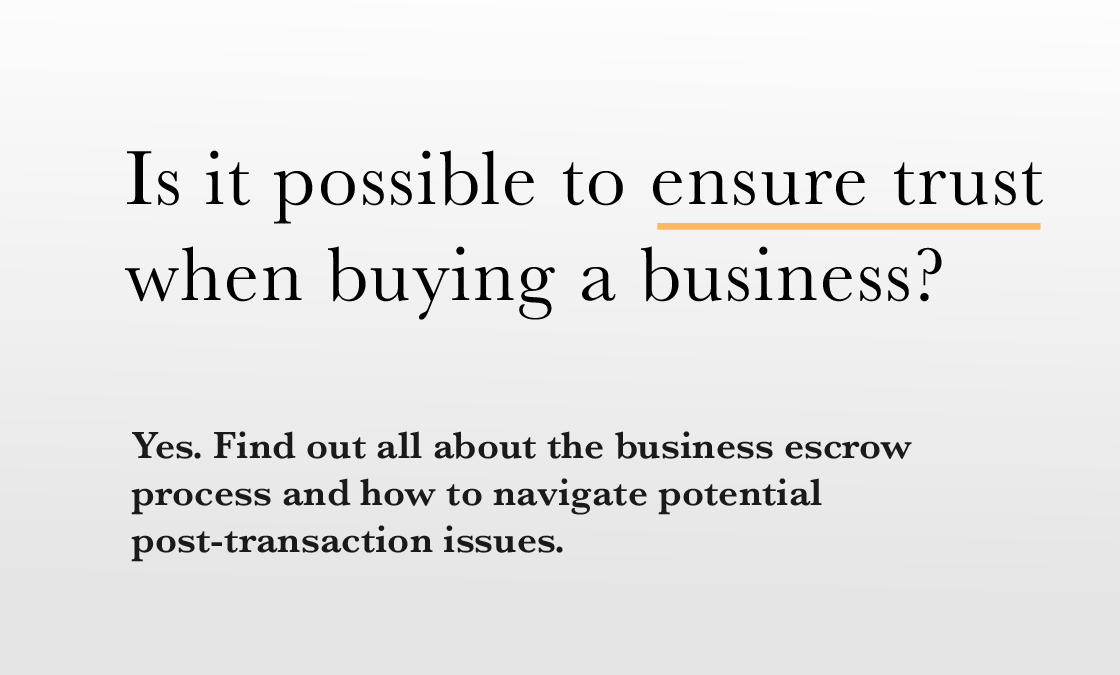A thorough due diligence process when buying a business will provide you a proper understanding of the financial health of the business. A due diligence investigation will tell you where a business might need extra investment capital, improved equipment, or reveal other factors that might be inhibiting growth and profits. Even if you are being thorough, there are typically some hidden surprises that become part of the inherit risk of buying and operating any business. Though these can be mitigated by the seller’s representations and warranties within a purchase agreement, minimizing the unknowns are your ultimate goal of any due diligence when buying a business.
Performing due diligence might mean signing some agreements with the seller
Before you can conduct a due diligence investigation of a target company, sellers will often require, and frankly should require, you to enter into a nondisclosure agreement or an NDA. Nondisclosure agreements protects the confidential information of the seller and allows you to give the seller confidence to be forthright in providing their finances and business records. An NDA will require the recipient of the confidential information to not share the information without the discloser’s approval and in most cases not use the confidential information to compete with the seller. If you plan on revealing or if there is a chance you may reveal certain confidential information to the seller, having a mutual NDA that protects the confidential information of both you and the seller is essential.
An NDA may only get you so far as comprehensive due diligence can be disruptive to a seller’s operation. Accordingly, you may need to show a higher level of commitment by either entering into a letter of intent, purchase agreement or even putting a little money down in escrow in order to show the seller you are serious. In each of these cases, such agreements can be drafted in a manner that give you as the buyer an easy no-obligation out in the event that something is uncovered during this due diligence or feasibility period.
Types of due diligence
Your due diligence when buying a business should be comprehensive. This may require expertise in multiple disciplines.
Financial Due Diligence
Financial due diligence gives you a glimpse into the viability of the company prior to buying. An in depth look into the company’s finances, including looking at the company’s balance sheets, accounts receivable, income statements, cash flow statements, and sales and rates of return quarterly and annual projections will provide a clue to the economic situation of the company. If the company sells multiple products, a request for a breakdown of the sales, rates of return, and gross profits by product should be made.
Equipment and Inventory Due Diligence
A list of the company’s existing equipment and inventory will give you an asset-based valuation of the company’s assets. A determination of the state of the equipment, and the costs of replacing, repairing, or updating the equipment, provides the buyer the means to estimate the costs of investment into the company. In addition, you should determine whether such equipment is paid in full or the company is leasing the equipment.
Legal due diligence
Regardless of whether an asset or equity purchase, as a buyer, you will need to be aware of any existing or future obligations of the company. This includes checking all contracts, leases, sales, distribution, employee and contractor agreements, and intellectual property the company may own. An investigation should be conducted into any compliance obligations of the company, such as keeping up with licenses, fines, fees, and avoiding violations of any state or federal regulations. You can avoid any unwanted tax obligations by performing a tax lien search, and make sure that the company is up to date on any state and federal tax filings. Further, a lien search with the state and county records will help notify you of any third-party interest in the seller’s business or property, as explained further below. If the company requires any insurance coverage, buyer should ask for the relevant documents, and any insurance claims the company has filed. A litigation search in the state court or federal court will show any pending, ongoing, or decided cases the business was involved in. If there is any litigation, or threatened litigation, or outstanding judgments against the company, a request for documents related to the litigation should be made.
Lien Search Due Diligence
It is imperative for you to conduct a thorough UCC search, sometimes called UCC-1 or financial statements, and lien search to find out if any third party has an interest in the seller’s property or business. The Uniform Commercial Code, or UCC, is a set of standardized commercial rules amongst most states. Regardless if a seller stated that they have paid off a particular debt, it does not automatically mean that the lien has been removed; a lien search will need to be performed to ensure that the lien has actually been removed. In addition, there are liens that the seller may not be aware of. It is important to know if seller’s business property has a lien because a lien can attach to the business assets, such as inventory, intellectual property, fixtures, accounts receivable, or bank accounts. A seller’s creditor can give notice to the public that they have (or might have) an interest in the seller’s property by filing a UCC lien with the appropriate governmental agency, usually the Secretary of State. In addition, you should conduct a county lien search. A county lien search is a lien search in the county where the business is physically located. It might be useful for you to also conduct a county lien search in any counties where the business had listed a physical address. A county lien search will reveal any liens on personal property through the county real estate records, called fixture filings. Also, most federal tax liens, state tax liens, and judgment liens are filed at the county level. You should be mindful of a large time gap between the time you conduct your lien search and the closing date, as liens may be filed during this time.
Organizational Due Diligence
You will want to ensure that the business has registered the seller’s entity (or entities) in each state that it operates and has kept up with the proper filings. You should also request to have access to the company’s organizational documents, including but not limited to, the company’s organizational documents (articles of incorporation or certificates of formation), operational documents (bylaws, company agreements, and operating agreements), minute book, the company’s assumed names, and list of owners (members or shareholders). Lastly, organizational due diligence includes checking to see if the business is in compliance with any state and federal licenses, permits, or regulations.
Human Capital Due Diligence
Employees are a huge part of a company’s expenses. An initial due diligence usually requests a list of employees, with each of their positions, salaries, and bonus structure. This will help guide whether you rehire the employees in an asset purchase or if in an equity or stock purchase you would need to know whether you’ll have to do some downsizing or have room to grow. You should also include in further diligence to determine whether any or all of the employees have any non-solicitation, non-disclosure, non-compete, or any other agreements that include any restrictions. A copy of company’s personnel handbook will provide you with information of employee benefits, holiday, vacation, and sick leave policies. A list of employment claims history or potential claims will give you an idea of the culture and potential risk when taking over as the employer of a workforce. These claims include alleged wrongful termination or discrimination, labor disputes, workers compensation claims, and any potential or settled claims will give you a look at areas that may be potential problems for you. A common issue with most small businesses is misclassification of certain workers as contractors when they should actually be employees. Accordingly, your due diligence should extend beyond just employees but the entire labor force that is being engaged by the target business.
Business Reputation Due Diligence.
A business’s success is related to the business’s reputation within its community, clients, and employees. Independent research into the market the business is a part of, and the future growth and needs of the market will provide an economic outlook of the company. This independent research would include looking into customer patterns, evolving needs of customers, improving technology, industry trends, business competitors, and surveys relevant to the company’s products or services. In addition, public perception of the company is important, any press releases or news articles related to the business or the market the business is in will provide the relevant information. The company’s social media presence, advertising programs, marketing plans, and marketing materials will provide you with information as to the company’s market, and potential markets the buyer could tap into.
Conclusion
Although conducting due diligence takes time and money, you should perform due diligence to know exactly how financially healthy a business is. To begin performing due diligence, you will likely need to enter into a nondisclosure agreement, and potentially other agreements, with the seller. It will not be enough to simply take the seller’s word on the status of the business, particularly if you know the seller. In order to properly protect yourself and your investment, you need to perform due diligence. A comprehensive due diligence investigation through the business’s assets, organizational and legal documentation, financial statements, and business reputation should reveal the requisite information in order to make a sound business decision.


![Buyers vs. Sellers: Negotiating Mergers & Acquisitions [e319]](https://www.pashalaw.com/wp-content/uploads/2022/06/Pasha_LSSB_BuyersVsSellers_banner-1024x723.jpg)
![Defining NDA Boundaries: When does it go too far? [e314]](https://www.pashalaw.com/wp-content/uploads/2021/09/Pasha_LSSB_NDA_WordPress-2-1024x723.jpg)
![Wrap Up | Behind the Buy [8/8] [309]](https://www.pashalaw.com/wp-content/uploads/2020/11/Pasha_BehindTheBuy_Episode8-1024x683.jpg)
![Is it all over? | Behind the Buy [7/8] [308]](https://www.pashalaw.com/wp-content/uploads/2020/09/iStock-1153248856-overlay-scaled-1024x683.jpg)
![Fight for Your [Trademark] Rights | Behind the Buy [6/8] [307]](https://www.pashalaw.com/wp-content/uploads/2020/07/Fight-for-your-trademark-right-1024x683.jpg)





![Law in the Digital Age: Exploring the Legal Intricacies of Artificial Intelligence [e323]](https://www.pashalaw.com/wp-content/uploads/2023/11/WhatsApp-Image-2023-11-21-at-13.24.49_4a326c9e-300x212.jpg)
![Unraveling the Workforce: Navigating the Aftermath of Mass Layoffs [e322]](https://www.pashalaw.com/wp-content/uploads/2023/07/Untitled-design-23-300x212.png)
![Return to the Office vs. Remote: What Can Employers Legally Enforce? [e321]](https://www.pashalaw.com/wp-content/uploads/2023/01/Pasha_LSSB_321_banner-300x212.jpg)
![Explaining the Hans Niemann Chess Lawsuit v. Magnus Carlsen [e320]](https://www.pashalaw.com/wp-content/uploads/2022/10/LAWYER-EXPLAINS-7-300x169.png)
![California v. Texas: Which is Better for Business? [313]](https://www.pashalaw.com/wp-content/uploads/2021/07/Pasha_LSSB_CaliforniaVSTexas-300x212.jpg)
![Buyers vs. Sellers: Negotiating Mergers & Acquisitions [e319]](https://www.pashalaw.com/wp-content/uploads/2022/06/Pasha_LSSB_BuyersVsSellers_banner-300x212.jpg)
![Employers vs. Employees: When Are Employment Restrictions Fair? [e318]](https://www.pashalaw.com/wp-content/uploads/2022/05/Pasha_LSSB_EmployeesVsEmployers_banner-1-300x212.jpg)
![Vaccine Mandates Supreme Court Rulings [E317]](https://www.pashalaw.com/wp-content/uploads/2022/02/WhatsApp-Image-2022-02-11-at-4.10.32-PM-300x212.jpeg)
![Business of Healthcare [e316]](https://www.pashalaw.com/wp-content/uploads/2021/11/Pasha_LSSB_BusinessofHealthcare_banner-300x212.jpg)
![Social Media and the Law [e315]](https://www.pashalaw.com/wp-content/uploads/2021/10/WhatsApp-Image-2021-10-06-at-1.43.08-PM-300x212.jpeg)
![Defining NDA Boundaries: When does it go too far? [e314]](https://www.pashalaw.com/wp-content/uploads/2021/09/Pasha_LSSB_NDA_WordPress-2-300x212.jpg)
![More Than a Mistake: Business Blunders to Avoid [312] Top Five Business Blunders](https://www.pashalaw.com/wp-content/uploads/2021/06/Pasha_LSSB_Blunders_WP-1-300x212.jpg)
![Is There a Right Way to Fire an Employee? We Ask the Experts [311]](https://www.pashalaw.com/wp-content/uploads/2021/02/Pasha_LSSB_FireAnEmployee_Website-300x200.jpg)
![The New Frontier: Navigating Business Law During a Pandemic [310]](https://www.pashalaw.com/wp-content/uploads/2020/12/Pasha_LSSB_Epidsode308_Covid_Web-1-300x200.jpg)
![Wrap Up | Behind the Buy [8/8] [309]](https://www.pashalaw.com/wp-content/uploads/2020/11/Pasha_BehindTheBuy_Episode8-300x200.jpg)
![Is it all over? | Behind the Buy [7/8] [308]](https://www.pashalaw.com/wp-content/uploads/2020/09/iStock-1153248856-overlay-scaled-300x200.jpg)
![Fight for Your [Trademark] Rights | Behind the Buy [6/8] [307]](https://www.pashalaw.com/wp-content/uploads/2020/07/Fight-for-your-trademark-right-300x200.jpg)
![They Let It Slip | Behind the Buy [5/8] [306]](https://www.pashalaw.com/wp-content/uploads/2020/06/Behind-the-buy-they-let-it-slip-300x200.jpg)
![Mo’ Investigation Mo’ Problems | Behind the Buy [4/8] [305]](https://www.pashalaw.com/wp-content/uploads/2020/05/interrobang-1-scaled-300x200.jpg)
![Broker or Joker | Behind the Buy [3/8] [304] Behind the buy - Broker or Joker](https://www.pashalaw.com/wp-content/uploads/2020/04/Joker-or-Broker-1-300x185.jpg)
![Intentions Are Nothing Without a Signature | Behind the Buy [2/8] [303]](https://www.pashalaw.com/wp-content/uploads/2020/04/intentions-are-nothing-without-a-signature-300x185.jpg)
![From First Steps to Final Signatures | Behind the Buy [1/8] [302]](https://www.pashalaw.com/wp-content/uploads/2020/04/first-steps-to-final-signatures-300x185.jpg)
![The Dark-side of GrubHub’s (and others’) Relationship with Restaurants [e301]](https://www.pashalaw.com/wp-content/uploads/2015/04/When-Competition-Goes-Too-Far-Ice-Cream-Truck-Edition-300x201.jpg)
![Ultimate Legal Breakdown of Internet Law & the Subscription Business Model [e300]](https://www.pashalaw.com/wp-content/uploads/2019/05/Ultimate-Legal-Breakdown-of-Internet-Law-the-Subscription-Business-Model-300x196.jpg)
![Why the Business Buying Process is Like a Wedding?: A Legal Guide [e299]](https://www.pashalaw.com/wp-content/uploads/2019/03/futura-300x169.jpg)
![Will Crowdfunding and General Solicitation Change How Companies Raise Capital? [e298]](https://www.pashalaw.com/wp-content/uploads/2018/11/Will-Crowdfunding-and-General-Solicitation-Change-How-Companies-Raise-Capital-300x159.jpg)
![Pirates, Pilots, and Passwords: Flight Sim Labs Navigates Legal Issues (w/ Marc Hoag as Guest) [e297]](https://www.pashalaw.com/wp-content/uploads/2018/07/flight-sim-labs-300x159.jpg)
![Facebook, Zuckerberg, and the Data Privacy Dilemma [e296] User data, data breach photo by Pete Souza)](https://www.pashalaw.com/wp-content/uploads/2018/04/data-300x159.jpg)
![What To Do When Your Business Is Raided By ICE [e295] I.C.E Raids business](https://www.pashalaw.com/wp-content/uploads/2018/02/ice-cover-300x159.jpg)
![General Contractors & Subcontractors in California – What you need to know [e294]](https://www.pashalaw.com/wp-content/uploads/2018/01/iStock-666960952-300x200.jpg)
![Mattress Giants v. Sleepoplis: The War On Getting You To Bed [e293]](https://www.pashalaw.com/wp-content/uploads/2017/12/sleepopolis-300x159.jpg)
![The Harassment Watershed [e292]](https://www.pashalaw.com/wp-content/uploads/2017/12/me-2-300x219.jpg)
![Investing and Immigrating to the United States: The EB-5 Green Card [e291]](https://www.pashalaw.com/wp-content/uploads/2012/12/eb-5-investment-visa-program-300x159.jpg)
![Responding to a Government Requests (Inquiries, Warrants, etc.) [e290] How to respond to government requests, inquiries, warrants and investigation](https://www.pashalaw.com/wp-content/uploads/2017/10/iStock_57303576_LARGE-300x200.jpg)
![Ultimate Legal Breakdown: Employee Dress Codes [e289]](https://www.pashalaw.com/wp-content/uploads/2017/08/Ultimate-Legal-Breakdown-Template-1-300x159.jpg)
![Ultimate Legal Breakdown: Negative Online Reviews [e288]](https://www.pashalaw.com/wp-content/uploads/2017/06/Ultimate-Legal-Breakdown-Online-Reviews-1-300x159.jpg)
![Ultimate Legal Breakdown: Social Media Marketing [e287]](https://www.pashalaw.com/wp-content/uploads/2017/06/ultimate-legal-breakdown-social-media-marketing-blur-300x159.jpg)
![Ultimate Legal Breakdown: Subscription Box Businesses [e286]](https://www.pashalaw.com/wp-content/uploads/2017/03/ultimate-legal-breakdown-subscription-box-services-pasha-law-2-300x159.jpg)
![Can Companies Protect Against Foreseeable Misuse of Apps [e285]](https://www.pashalaw.com/wp-content/uploads/2017/01/iStock-505291242-300x176.jpg)
![When Using Celebrity Deaths for Brand Promotion Crosses the Line [e284]](https://www.pashalaw.com/wp-content/uploads/2017/01/celbrity-300x159.png)
![Are Employers Liable When Employees Are Accused of Racism? [e283] Racist Employee](https://www.pashalaw.com/wp-content/uploads/2016/12/Are-employers-liable-when-an-employees-are-accused-of-racism-300x159.jpg)
![How Businesses Should Handle Unpaid Bills from Clients [e282] What to do when a client won't pay.](https://www.pashalaw.com/wp-content/uploads/2016/12/How-Businesses-Should-Handle-Unpaid-Bills-to-Clients-300x159.png)
![Can Employers Implement English Only Policies Without Discriminating? [e281]](https://www.pashalaw.com/wp-content/uploads/2016/11/Can-Employers-Impliment-English-Only-Policies-Without-Discriminating-300x159.jpg)
![Why You May No Longer See Actors’ Ages on Their IMDB Page [e280]](https://www.pashalaw.com/wp-content/uploads/2016/10/IMDB-AGE2-300x159.jpg)
![Airbnb’s Discrimination Problem and How Businesses Can Relate [e279]](https://www.pashalaw.com/wp-content/uploads/2016/09/airbnb-300x159.jpg)
![What To Do When Your Amazon Account Gets Suspended [e278]](https://www.pashalaw.com/wp-content/uploads/2016/09/What-To-Do-When-Your-Amazon-Account-Gets-Suspended-1-300x200.jpg)
![How Independent Artists Reacted to Fashion Mogul Zara’s Alleged Infringement [e277]](https://www.pashalaw.com/wp-content/uploads/2016/08/How-Independent-Artists-Reacted-to-Fashion-Mogul-Zaras-Alleged-Infringement--300x159.jpg)
![Can Brave’s Ad Replacing Software Defeat Newspapers and Copyright Law? [e276]](https://www.pashalaw.com/wp-content/uploads/2016/08/Can-Braves-Ad-Replacing-Software-Defeat-Newspapers-and-Copyright-Law-300x159.jpg)
![Why The Roger Ailes Sexual Harassment Lawsuit Is Far From Normal [e275]](https://www.pashalaw.com/wp-content/uploads/2016/07/WHY-THE-ROGER-AILES-SEXUAL-HARASSMENT-LAWSUIT-IS-FAR-FROM-NORMAL-300x159.jpeg)
![How Starbucks Turned Coveted Employer to Employee Complaints [e274]](https://www.pashalaw.com/wp-content/uploads/2016/07/iStock_54169990_LARGE-300x210.jpg)
